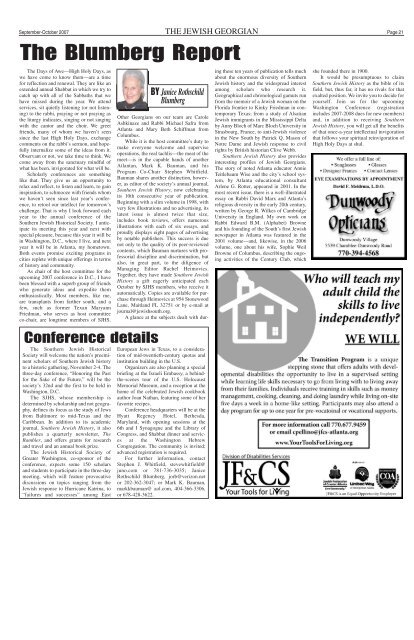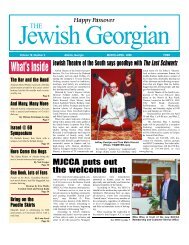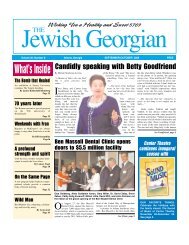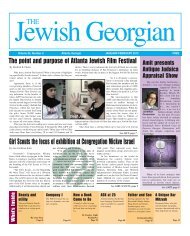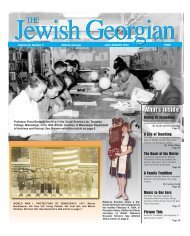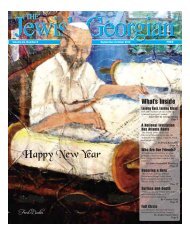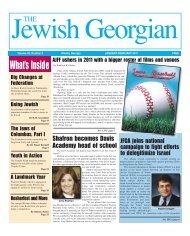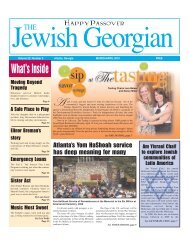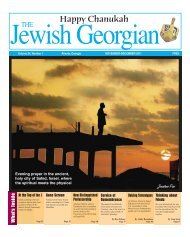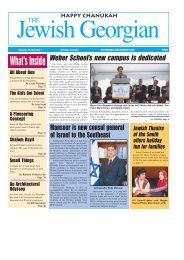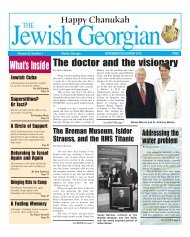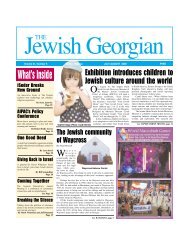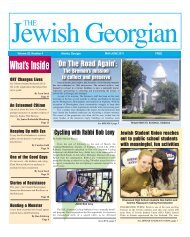You also want an ePaper? Increase the reach of your titles
YUMPU automatically turns print PDFs into web optimized ePapers that Google loves.
September-October 2007 THE JEWISH GEORGIAN Page 21<br />
<strong>The</strong> Blumberg Report<br />
<strong>The</strong> Days of Awe—High Holy Days, as<br />
we have come to know them—are a time<br />
for reflection and renewal. <strong>The</strong>y are like an<br />
extended annual Shabbat in which we try to<br />
catch up with all of the Sabbaths that we<br />
have missed during the year. We attend<br />
services, sit quietly listening (or not listening)<br />
to the rabbi, praying or not praying as<br />
the liturgy indicates, singing or not singing<br />
with the cantor and the choir. We greet<br />
friends, many of whom we haven’t seen<br />
since the last High Holy Days, exchange<br />
comments on the rabbi’s sermon, and hopefully<br />
internalize some of the ideas from it.<br />
Observant or not, we take time to think. We<br />
come away from the sanctuary mindful of<br />
what has been, invigorated for what will be.<br />
Scholarly conferences are something<br />
like that. <strong>The</strong>y give us an opportunity to<br />
relax and reflect, to listen and learn, to gain<br />
inspiration, to schmooze with friends whom<br />
we haven’t seen since last year’s conference,<br />
to retool our intellect for tomorrow’s<br />
challenge. That is why I look forward each<br />
year to the annual conference of the<br />
Southern <strong>Jewish</strong> Historical Society. I anticipate<br />
its meeting this year and next with<br />
special pleasure, because this year it will be<br />
in Washington, D.C., where I live, and next<br />
year it will be in Atlanta, my hometown.<br />
Both events promise exciting programs in<br />
cities replete with unique offerings in terms<br />
of history and community.<br />
As chair of the host committee for the<br />
upcoming 2007 conference in D.C., I have<br />
been blessed with a superb group of friends<br />
who generate ideas and expedite them<br />
enthusiastically. Most members, like me,<br />
are transplants from farther south, and a<br />
few, such as former Texan Maryann<br />
Friedman, who serves as host committee<br />
co-chair, are longtime members of SJHS.<br />
Conference details<br />
<strong>The</strong> Southern <strong>Jewish</strong> Historical<br />
Society will welcome the nation’s preeminent<br />
scholars of Southern <strong>Jewish</strong> history<br />
to a historic gathering, November 2-4. <strong>The</strong><br />
three-day conference, “Honoring the Past<br />
for the Sake of the Future,” will be the<br />
society’s 32nd and the first to be held in<br />
Washington, D.C.<br />
<strong>The</strong> SJHS, whose membership is<br />
determined by scholarship and not geography,<br />
defines its focus as the study of Jews<br />
from Baltimore to mid-Texas and the<br />
Caribbean. In addition to its academic<br />
journal, Southern <strong>Jewish</strong> History, it also<br />
publishes a quarterly newsletter, <strong>The</strong><br />
Rambler, and offers grants for research<br />
and travel and an annual book prize.<br />
<strong>The</strong> <strong>Jewish</strong> Historical Society of<br />
Greater Washington, co-sponsor of the<br />
conference, expects some 150 scholars<br />
and students to participate in the three-day<br />
meeting, which will feature provocative<br />
discussions on topics ranging from the<br />
<strong>Jewish</strong> response to Hurricane Katrina, to<br />
“failures and successes” among East<br />
BY Janice Rothschild<br />
Blumberg<br />
Other <strong>Georgian</strong>s on our team are Carole<br />
Ashkinaze and Rabbi Michael Safra from<br />
Atlanta and Mary Beth Schiffman from<br />
Columbus.<br />
While it is the host committee’s duty to<br />
make everyone welcome and supervise<br />
operations, the real tachlis—the meat of the<br />
meet—is in the capable hands of another<br />
Atlantan, Mark K. Bauman, and his<br />
Program Co-Chair Stephen Whitfield.<br />
Bauman shares another distinction, however,<br />
as editor of the society’s annual journal,<br />
Southern <strong>Jewish</strong> History, now celebrating<br />
its 10th consecutive year of publication.<br />
Beginning with a slim volume in 1998, with<br />
very few illustrations and no advertising, its<br />
latest issue is almost twice that size,<br />
includes book reviews, offers numerous<br />
illustrations with each of six essays, and<br />
proudly displays eight pages of advertising<br />
by notable publishers. This success is due<br />
not only to the quality of its peer-reviewed<br />
contents, which Bauman nurtures with professorial<br />
discipline and discrimination, but<br />
also, in great part, to the diligence of<br />
Managing Editor Rachel Heimovics.<br />
Together, they have made Southern <strong>Jewish</strong><br />
History a gift eagerly anticipated each<br />
October by SJHS members, who receive it<br />
automatically. Copies are available for purchase<br />
through Heimovics at 954 Stonewood<br />
Lane, Maitland FL 32751 or by e-mail at<br />
journal@jewishsouth.org.<br />
A glance at the subjects dealt with dur-<br />
European Jews in Texas, to a consideration<br />
of mid-twentieth-century quotas and<br />
institution building in the U.S.<br />
Organizers are also planning a special<br />
briefing at the Israeli Embassy, a behindthe-scenes<br />
tour of the U.S. Holocaust<br />
Memorial Museum, and a reception at the<br />
home of the celebrated <strong>Jewish</strong> cookbook<br />
author Joan Nathan, featuring some of her<br />
favorite recipes.<br />
Conference headquarters will be at the<br />
Hyatt Regency Hotel, Bethesda,<br />
Maryland, with opening sessions at the<br />
6th and I Synagogue and the Library of<br />
Congress, and Shabbat dinner and services<br />
at the Washington Hebrew<br />
Congregation. <strong>The</strong> community is invited;<br />
advanced registration is required.<br />
For further information, contact<br />
Stephen J. Whitfield, stevewhitfield@<br />
juno.com or 781-736-3035; Janice<br />
Rothschild Blumberg, jorb@verizon.net<br />
or 202-362-3047; or Mark K. Bauman,<br />
markkbauman@ aol.com, 404-366-3306,<br />
or 678-428-3622.<br />
ing these ten years of publication tells much<br />
about the enormous diversity of Southern<br />
<strong>Jewish</strong> history and the widespread interest<br />
among scholars who research it.<br />
Geographical and chronological gamuts run<br />
from the memoir of a <strong>Jewish</strong> woman on the<br />
Florida frontier to Kinky Friedman in contemporary<br />
Texas; from a study of Alsatian<br />
<strong>Jewish</strong> immigrants in the Mississippi Delta<br />
by Anny Bloch of Marc Bloch University in<br />
Strasbourg, France, to anti-<strong>Jewish</strong> violence<br />
in the New South by Patrick Q. Mason of<br />
Notre Dame and <strong>Jewish</strong> response to civil<br />
rights by British historian Clive Webb.<br />
Southern <strong>Jewish</strong> History also provides<br />
interesting profiles of <strong>Jewish</strong> <strong>Georgian</strong>s.<br />
<strong>The</strong> story of noted Atlanta educator Annie<br />
Teitlebaum Wise and the city’s school system,<br />
by Atlanta educational consultant<br />
Arlene G. Rotter, appeared in 2001. In the<br />
most recent issue, there is a well-illustrated<br />
essay on Rabbi David Marx and Atlanta’s<br />
religious diversity in the early 20th century,<br />
written by George R. Wilkes of Cambridge<br />
University in England. My own work on<br />
Rabbi Edward B.M. (Alphabet) Browne<br />
and his founding of the South’s first <strong>Jewish</strong><br />
newspaper in Atlanta was featured in the<br />
2001 volume—and, likewise, in the 2006<br />
volume, one about his wife, Sophie Weil<br />
Browne of Columbus, describing the ongoing<br />
activities of the Century Club, which<br />
she founded there in 1900.<br />
It would be presumptuous to claim<br />
Southern <strong>Jewish</strong> History as the bible of its<br />
field, but, thus far, it has no rivals for that<br />
exalted position. We invite you to decide for<br />
yourself. Join us for the upcoming<br />
Washington Conference (registration<br />
includes 2007-2008 dues for new members)<br />
and, in addition to receiving Southern<br />
<strong>Jewish</strong> History, you will get all the benefits<br />
of that once-a-year intellectual invigoration<br />
that follows your spiritual reinvigoration of<br />
High Holy Days at shul.


